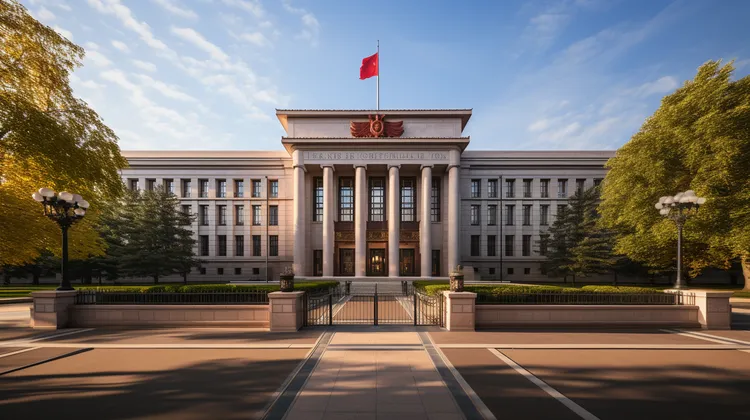
Call for Global Crypto Regulation by China’s Central Bank
In response to the growing concerns over the turmoil that cryptocurrencies can cause in financial markets, the People’s Bank of China (PBOC) has called for global cooperation to regulate these digital assets. The Chinese central bank has long held a skeptical view of cryptocurrencies due to their potential for money laundering, tax evasion, and financial instability. With the advent of a new digital era, regulators worldwide are grappling with the implications of a rapidly evolving crypto landscape.
Cryptocurrencies, the likes of Bitcoin, Ethereum, and countless others, have gained traction among investors and technology enthusiasts for their ability to provide decentralized, peer-to-peer transactions. They have also been used for illicit activities, given their difficulty to trace. With China being one of the first nations to take a harsh stance against cryptocurrencies, it has now emerged as a vocal advocate for synchronized regulatory approaches.
The Chinese central bank’s appeal for international cooperation comes at a time when cryptocurrency markets have shown just how volatile they can be. Massive price swings and instances of market manipulation have prompted financial watchdogs around the globe to consider how these assets should be supervised. The PBOC emphasizes that without collective efforts, regulating these entities would be remarkably challenging due to their borderless nature.
The call for joint regulation is not without precedent; financial systems have long been subject to international norms and agreements. From the Basel Accords, which set international banking standards, to the Financial Action Task Force (FATF) that combats money laundering, the precedent exists for worldwide financial collaboration. The central bank of China asserts that the same level of coherence is required for cryptocurrency.
Truth be told, the global regulatory landscape for crypto is fragmented. Some countries have embraced the technology, looking to become hubs of innovation, while others, like China, have banned their use outright. This disconnect adds layers of complexity for regulators and could potentially create safe havens for nefarious crypto activities.
Despite its firm stance, China isn’t just campaigning for regulation—it is also leading by example. It has introduced its own digital currency, the Digital Currency Electronic Payment (DCEP), to digitize the yuan and exert greater control over its financial system. This move presents a clear contrast to the decentralized cryptos it seeks to regulate. Through this initiative, China is looking to modernize its currency system, improve transaction efficiency, and reinforce monetary sovereignty.
The PBOC emphasizes that regulating crypto does not necessarily mean stifling innovation. The goal is to ensure that growth in the fintech sector does not compromise financial security. Consumer protection, transparency, and the integrity of the financial system are priorities essential to maintaining trust and stability.
Engagement in international forums is key to finding a consensus on regulating cryptocurrencies. The G20, for instance, has already begun to address some of these challenges by discussing common standards for crypto-assets. It will take dedication and a shared vision from the world’s largest economies to create a clear set of rules that strike the right balance between innovation and protection.
One of the main challenges is the rapidly evolving nature of blockchain technology and related financial products. Regulators need to be nimble and informed, constantly updating their knowledge base to keep pace with these advances. This requires a collaborative effort from both government entities and crypto industry experts.
Achieving consensus is complex. Nations have differing economic structures, levels of technological advancement, and priorities for financial regulation. Some countries may fear over-regulation could stifle growth and innovation at a time when emerging technologies have the potential to reshape entire industries.
Enforcing international regulations involves navigating the asymmetric legal frameworks of different countries, requiring significant diplomatic effort. Yet the consequences of inertia could be significant; a poorly regulated crypto space poses risks not only to uninformed investors but also to the broader financial system.
While the PBOC is adamant about the need for comprehensive crypto regulation, its call to action is a mere starting point for what will likely be a complex and prolonged dialogue among nations. Achieving balance between harnessing the potential of cryptocurrencies and protecting the financial system is a global challenge—one that demands a synchronized, thoughtful response from regulators the world over. The road ahead is fraught with technical, political, and economic obstacles, but it is a journey that must be undertaken to usher in a new age of digital finance responsibly.
3 thoughts on “Call for Global Crypto Regulation by China’s Central Bank”
Leave a Reply
You must be logged in to post a comment.
Massive regulation will just drive the innovation underground, making things riskier! 👎
The pursuit of crypto regulation signals a commitment to financial integrity that I can get behind!
Keeping up with blockchain tech is challenging but necessary for effective regulation. Cheers to those leading the way!